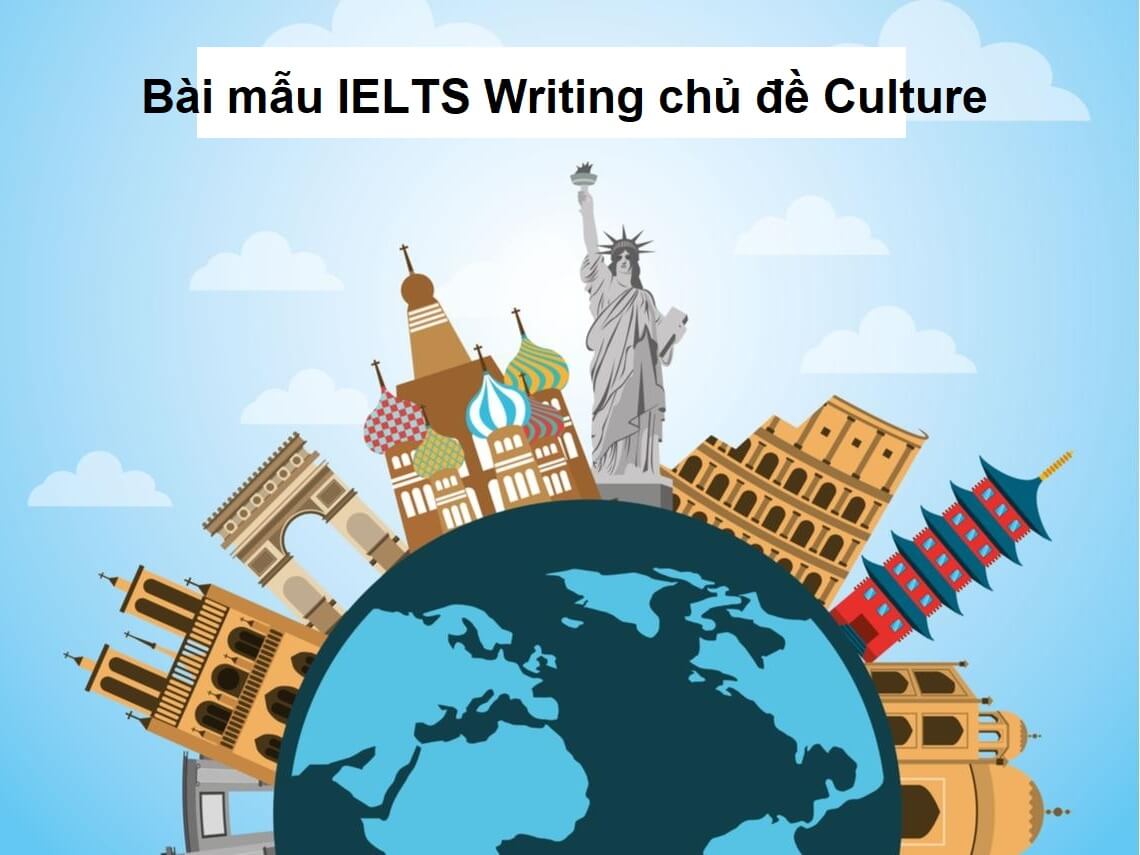Culture là một chủ đề khá thú vị và thường được ra thi trong bài thi IELTS. Nhưng không phải ai cũng có đầy đủ vốn từ vựng về chủ đề này. 4Life English Center (e4Life.vn) sẽ giúp bạn bổ sung kho từ vựng IELTS chủ đề Culture và bài mẫu tham khảo qua bài viết sau.

1. Từ vựng IELTS chủ đề Culture
1.1. Collocations ghép với Cultural
- Cultural degradation: Sự xói mòn về mặt văn hoá
- Cultural richness/ Cultural diversity: Sự đa dạng văn hoá
- Cultural globalization: Toàn cầu hoá văn hoá
- Cultural integration: Sự hội nhập văn hoá
- Cultural exchange: Trao đổi văn hoá
- Cultural festival: Lễ hội văn hoá
- Cultural specificity: Nét đặc trưng văn hoá
- Cultural uniqueness: Nét văn hoá đặc sắc
- Cultural assimilation: Sự đồng hoá văn hoá
- The total loss of cultural identity: Sự đánh mất bản sắc văn hoá
- Intangible cultural heritage of humanity: Di sản văn hóa phi vật thể của nhân loại
1.2. Collocations ghép với Cultur

- Culture shock: Sốc văn hoá
- Social culture: Văn hoá xã hội
- Contemporary culture / modern culture: Văn hoá đương đại
- National culture legacy: Di sản văn hoá quốc gia
- Folk culture: Văn hoá dân gian
- Indigenous culture: Văn hoá bản địa
- Exotic culture: Văn hoá nước ngoài xâm nhập vào, văn hoá ngoại lai
- A diversified culture: Nền văn hoá đa dạng
- Deep-rooted culture: Văn hoá bám sâu vào cội rẽ
- Local culture: Văn hoá địa phương
- Time-honoured culture/ Long-standing culture: Nền văn hoá lâu đời
1.3. Một số từ vựng khác
- Show prejudice (against sb/st): Thể hiện thành kiến với ai/cái gì
- Historic site: Di tích lịch sử
- Civilize something: khai sáng thứ gì đó
- Ritual: Lễ nghi
- Acculturation: Sự tiếp nhận và biến đổi văn hóa
- National identity: Bản sắc dân tộc
- Racism: Chủ nghĩa phân biệt chủng tộc
- To be imbued with national identity: Đậm đà bản sắc dân tộc
- Melting-pot society / Multi-cultural society: Xã hội đa văn hoá, đa sắc tộc
- Civilization: Nền văn minh
- Race conflict: Xung đột sắc tộc
- Custom: Phong tục, tục lệ (a way of behaving or a belief that has been established for a long time)
- Indigenous: bản xứ, bản địa (naturally existing in a place or country rather than arriving from another place)
- Depravity: sự trụy lạc, sa đọa (the state of being morally bad, or an action that is morally bad)
- Incense: nhang, hương, trầm (a substance that is burnt to produce a sweet smell, especially as part of a religious ceremony)
- Ceremony: Nghi thức, nghi lễ (formal acts, often fixed and traditional, performed on important social or religious occasions)
- Aboriginal: ban sơ, nguyên thủy (a member of a race of people who were the first people to live in a country, before any colonists arrived)
- Heritage: di sản (features belonging to the culture of a particular society, such as traditions, languages, or buildings)
- Bicentenary: lễ kỉ năm được tổ chức mỗi 200 năm 1 lần (the day or year that is 200 years after a particular event, especially an important one)
- Ancestor: tổ tiên (any member of your family from long ago, for example, the grandparents of your grandparents)
2. Bài mẫu IELTS Writing chủ đề Culture

Some people feel that cultural traditions are ruined when people use them to make money from tourists. Others claim that using these traditions as money-making ventures is the only way to save them. In my opinion, both views are true to a certain extent.
To begin with, many traditional customs are modified for commercialization and end up losing their originality and value. For example, Vietnamese traditional dances such as the lion dance, which were traditionally performed only by martial artists during special occasions, are now often poorly performed by amateurs at tourist sites across the country. Such changes not only give foreign visitors a false impression but can also make the dance less meaningful to the local people. Also, many traditionally sacred sites are heavily damaged by the irresponsible behaviors of tourists. For instance, a well-known Youtuber named Logan Paul recently visited Japan and filmed himself dumping a bag of coins into a sacred well, where people often drop coins for luck and did permanent damage to one of Japan’s most famous iconic traditions.
On the other hand, there are several reasons why monetizing from cultural traditions is the only way to protect them. First, the revenue could be used for the preservation of such traditions. For example, many people in Bat Trang village in Vietnam make their living from selling traditional ceramic products and thus are able to continue one of the oldest traditions in Vietnam. Second, by putting cultural traditions on public display, the government could heighten people’s awareness of preserving these traditions. For instance, the Vietnamese government has built several museums around the country that solely exhibit examples of ethnic minority cultures in an attempt to protect cultural values without affecting the lives of these ethnic people, yet successfully gathering lots of public attention and support.
In conclusion, using cultural traditions as money-making attractions has both positive and negative impacts on the preservation of such traditions.
Hy vọng bài viết trên đây đã bổ cập về từ vựng IELTS chủ đề culture. 4Life English Center (e4Life.vn) hy vọng bạn sẽ có nguồn tham khảo thêm về collocation trong chủ đề Culture. Chúc các bạn thi tốt.




